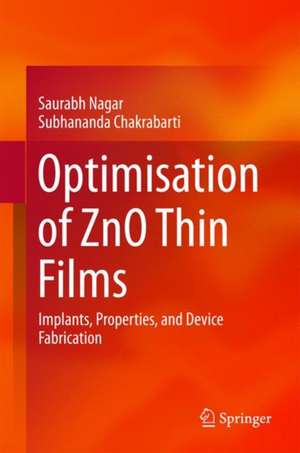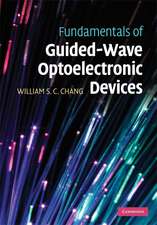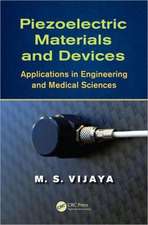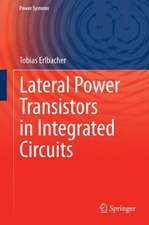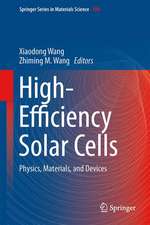Optimisation of ZnO Thin Films: Implants, Properties, and Device Fabrication
Autor Saurabh Nagar, Subhananda Chakrabartien Limba Engleză Hardback – 6 iun 2017
| Toate formatele și edițiile | Preț | Express |
|---|---|---|
| Paperback (1) | 542.88 lei 38-44 zile | |
| Springer Nature Singapore – 15 aug 2018 | 542.88 lei 38-44 zile | |
| Hardback (1) | 637.13 lei 3-5 săpt. | |
| Springer Nature Singapore – 6 iun 2017 | 637.13 lei 3-5 săpt. |
Preț: 637.13 lei
Preț vechi: 749.56 lei
-15% Nou
Puncte Express: 956
Preț estimativ în valută:
121.93€ • 132.40$ • 102.42£
121.93€ • 132.40$ • 102.42£
Carte disponibilă
Livrare economică 01-15 aprilie
Preluare comenzi: 021 569.72.76
Specificații
ISBN-13: 9789811008085
ISBN-10: 9811008086
Pagini: 113
Ilustrații: XIX, 83 p. 67 illus., 36 illus. in color.
Dimensiuni: 155 x 235 mm
Greutate: 0.33 kg
Ediția:1st ed. 2017
Editura: Springer Nature Singapore
Colecția Springer
Locul publicării:Singapore, Singapore
ISBN-10: 9811008086
Pagini: 113
Ilustrații: XIX, 83 p. 67 illus., 36 illus. in color.
Dimensiuni: 155 x 235 mm
Greutate: 0.33 kg
Ediția:1st ed. 2017
Editura: Springer Nature Singapore
Colecția Springer
Locul publicării:Singapore, Singapore
Cuprins
Introduction.- Optimisation of PLD Parameters.- Implantation Studies.- Fabrication of Optoelectronics Devices.- Summary and Future Works.
Notă biografică
Saurabh Nagar received the Bachelor of Technology in Electronics and Communication Engineering from the Bengal College of Engineering and Technology, West Bengal University of Technology, India and completed his PhD from the Department of Electrical Engineering, Indian Institute of Technology Bombay, Mumbai, India in 2013. He worked as a Research Associate at the Indian Institute of Technology Bombay for 9 months followed by a Post Doctoral Fellow at Institut des Nanotechnologie de Lyon (INL), Ecole Centrale de Lyon for 18 months. Presently he is a scientific employee at the Institute Functional Oxides fro Energy Efficient Information Technologies at Helmholtz Zentrum Berlin. His research interest includes ZnO-based optoelectronics devices and oxide-based materials for memristor applications.
Subhananda Chakrabarti received his M.Sc. and Ph.D. degrees from the Department of Electronic Science, University of Calcutta, Kolkata, India in 1993 and 2000, respectively. He was a Lecturer in the Dept. of Physics, St. Xavier’s College, Kolkata. He has been a Senior Research Fellow with the University of Michigan, Ann Arbor, from 2001 to 2005, a Senior Researcher with Dublin City University, Dublin City, Ireland, from 2005 to 2006, and a Senior Researcher (RA2) with the University of Glasgow, Glasgow, U.K., from 2006 to 2007. He joined as an Assistant Professor in the Department of Electrical Engineering, IIT Bombay, Mumbai, India, in 2007. Presently, he is a Professor in the same department. He is a Fellow of the Institution of Electrical and Telecommunication Engineers (IETE) India and also a Member of the IEEE, MRS USA, SPIE USA etc. He is the 2016 medal recipient of the Materials Research Society ofIndia and was also awarded the 2016 NASI-Reliance Industries Platinum Jubilee Award for Application Oriented Innovations in Physical Sciences. . He serves as an Editor of the IEEE Journal of Electron Device Society. He has authored more than 250 papers in international journals and conferences. He has also co-authored a couple of book chapters on intersubband quantum dot detectors. Dr. S. Chakrabarti serves as reviewer for a number of international journals of repute such as Applied Physics Letters, Nature Scientific Reports, IEEE Photonics Technology Letters, IEEE Journal of Quantum Electronics, Journal of Alloys and Compound, Material Research Bulletin etc. His research interests lie in compound (III-V and II-VI) semiconductor based optoelectronic materials and devices.
Subhananda Chakrabarti received his M.Sc. and Ph.D. degrees from the Department of Electronic Science, University of Calcutta, Kolkata, India in 1993 and 2000, respectively. He was a Lecturer in the Dept. of Physics, St. Xavier’s College, Kolkata. He has been a Senior Research Fellow with the University of Michigan, Ann Arbor, from 2001 to 2005, a Senior Researcher with Dublin City University, Dublin City, Ireland, from 2005 to 2006, and a Senior Researcher (RA2) with the University of Glasgow, Glasgow, U.K., from 2006 to 2007. He joined as an Assistant Professor in the Department of Electrical Engineering, IIT Bombay, Mumbai, India, in 2007. Presently, he is a Professor in the same department. He is a Fellow of the Institution of Electrical and Telecommunication Engineers (IETE) India and also a Member of the IEEE, MRS USA, SPIE USA etc. He is the 2016 medal recipient of the Materials Research Society ofIndia and was also awarded the 2016 NASI-Reliance Industries Platinum Jubilee Award for Application Oriented Innovations in Physical Sciences. . He serves as an Editor of the IEEE Journal of Electron Device Society. He has authored more than 250 papers in international journals and conferences. He has also co-authored a couple of book chapters on intersubband quantum dot detectors. Dr. S. Chakrabarti serves as reviewer for a number of international journals of repute such as Applied Physics Letters, Nature Scientific Reports, IEEE Photonics Technology Letters, IEEE Journal of Quantum Electronics, Journal of Alloys and Compound, Material Research Bulletin etc. His research interests lie in compound (III-V and II-VI) semiconductor based optoelectronic materials and devices.
Textul de pe ultima copertă
This monograph describes the different implantation mechanisms which can be used to achieve strong, reliable and stable p-type ZnO thin films. The results will prove useful in the field of optoelectronics in the UV region. This book will prove useful to research scholars and professionals working on doping and implantation of ZnO thin films and subsequently fabricating optoelectronic devices. The first chapter of the monograph emphasises the importance of ZnO in the field of optoelectronics for ultraviolet (UV) region and also discusses the material, electronic and optical properties of ZnO. The book then goes on to discuss the optimization of pulsed laser deposited (PLD) ZnO thin films in order to make successful p-type films. This can enable achievement of high optical output required for high-efficiency devices. The book also discusses a hydrogen implantation study on the optimized films to confirm whether the implantation leads to improvement in the optimized results.
Caracteristici
Covers implantation in ZnO based thin films to optimize device performance Will be specifically useful for optoelectronics in the UV region Includes hydrogen implantation studies for improved optimization Includes supplementary material: sn.pub/extras
